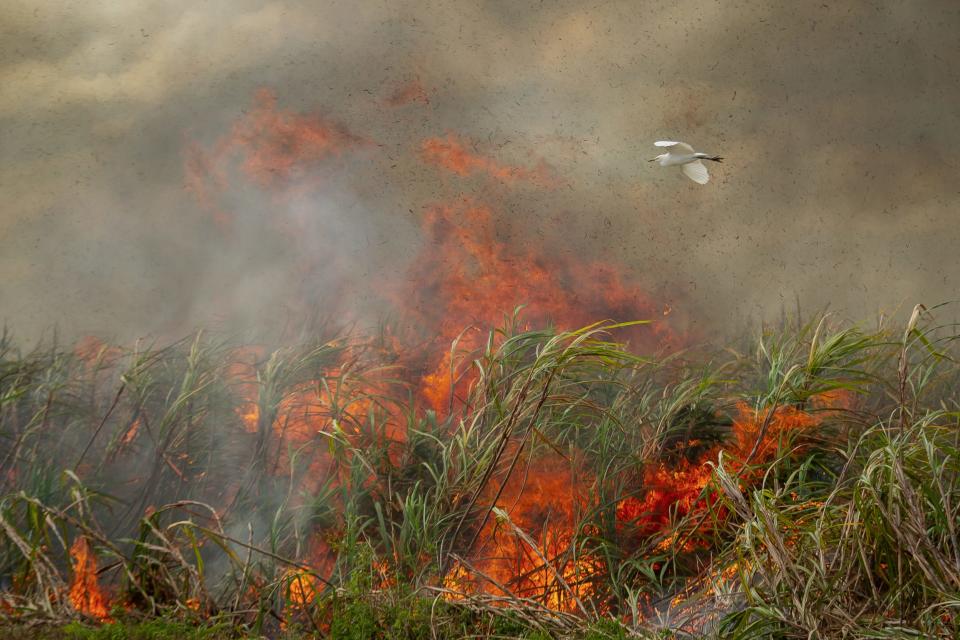Sugar-cane burning polices racially discriminate against people in Glades, complaint says
Citing federal civil rights law, the Sierra Club and its Glades-based Stop the Burn campaign are calling on the Environmental Protection Agency, the U.S. Department of Agriculture and the Department of Justice to investigate the Florida Forest Service’s practice of authorizing sugar-cane field fires that send smoke and ash over predominately Black communities while sparing largely white communities from the fires’ effects.
The group’s complaint filed Friday details state policies in place since 1991 to deny the fire permits when winds are blowing east toward Wellington, Royal Palm Beach and Westlake while allowing them when winds are blowing west.
Read The Post's 2022 investigation Glades residents left behind: Nikki Fried’s ‘changes’ to cane burning served only Big Sugar
The Civil Rights Act of 1964 prohibits entities receiving federal funding from discriminating or denying equal access to benefits based on race, color or national origin. Florida’s Forest Service receives money from the EPA as well as the Department of Agriculture. The Forest Service did not respond to a request for comment.
“The best outcome is that after a preliminary investigation the EPA initiates a voluntary compliance discussion with the state,” Sierra Club attorney Karimah Schoenhut said Tuesday. “Hopefully that would lead to more protective buffers and a phaseout of the burning.”
The Stop the Burn Campaign has long called on the state to deny permits for fires within 27 miles of communities affected by the burns and urged sugar companies to change their harvesting method to the mechanized, nonpolluting, “green” harvesting. The eastern communities protected by those policies are about 30 miles from sugar-cane fields. Green harvesting is practiced in other U.S. sugar-growing states as well as Brazil and all other sugar-producing countries except China.

The complaint points to studies showing fine particle pollution released by industrial agricultural burning penetrates deeply into lungs, causing potentially fatal conditions that include coronary artery disease, lung cancer and strokes as well as asthma, bronchitis and chronic pulmonary disease. The complaint also cites the study released by Florida State University scientists in 2022 specifically examining the effects of sugar-cane fires in South Florida, finding exposure to smoke from the burns causes from one to six premature deaths a year.
It also cites the 2021 Palm Beach Post and ProPublica investigation documenting health effects experienced by Glades residents correlated with spikes in pollution caused by the blazes. The investigation, which was recognized as a Pulitzer Prize finalist, also found that the monitoring that the EPA relies on to determine Clean Air Act compliance does not capture the short-term bursts of pollution caused by cane fires.
The Sierra Club analyzed Forest Service 2022 records of burn authorizations and denials and wind direction data as well as daily screen grabs of maps showing smoke and ash plumes of authorized blazes. It found that the data illustrated the disparate effects of the state policy.
Read Post/ProPublica Pulitzer finalist: Here are the first 2 parts of the Black Snow sugar cane burning series, a finalist for the Pulitzer Prize
Policy 'changes' by Nikki Fried are racially biased, complaint says
The complaint notes that the policy summarized in documents released by the division under then-Agriculture and Consumer Services Commissioner Nikki Fried has racially discriminatory effects, depriving the largely Black communities in the Glades of protections enjoyed by majority white communities. As a result, the complaint says, Black communities are subjected to pollution linked to chronic and fatal health conditions.
The state's policy not only denies largely Black communities the protection from pollution offered to white majority communities, but, by shifting the burden of pollution from the whiter communities, increases the number of fires that bring smoke and ash to the Glades.
The complaint, which says the EPA has failed to implement Clean Air Act standards in the Glades, asks the Department of Justice to oversee the investigation to ensure compliance with the Civil Rights Act of 1964.
This article originally appeared on Palm Beach Post: Sugar cane fire permits in Florida violate civil rights law, group says

